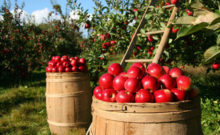Eating organic produce is becoming more and more popular as ongoing scientific research continues to show how damaging pesticides are to people’s systems. However, purchasing organic vegetables is often more expensive than buying traditionally grown ones. Luckily budget constraints can be respected while still purchasing healthy organic vegetables. You just have to follow a few tips to get the best deals possible.
Shop in Season
When shopping for organic foods, purchase what is in season. These items will be the freshest, most available and the least expensive. Purchasing winter vegetables such as squash, cabbage, ruttabaga, potatoes, kale and cauliflower in the colder months is a much more affordable option than trying to continue buying spring and summer vegetables. Purchase fresh organic vegetables in season and round out your menu with frozen, canned and preserved options for out of season produce.
Farmer’s Markets
Purchasing organic produce directly from the farmer at a farmer’s market can help to save money as well. Not only does this cut out any transportation costs of shipping the produce out to many grocery stores across the nation, it also means that the organic food is not marked up by the stores. Instead, all of the profit from the sale of the foods goes directly to the farmer to help fund his organically grown foods. As an additional bonus, organic vegetables are often much fresher when purchased from farmer’s markets as opposed to grocery stores.
Buying Clubs and Co-Ops
Another great way to save money and still get amazingly fresh organic vegetables is to join a buying club or co-operative. These groups usually have small members fees but can offer huge savings to members. An organic buying club purchases a large quantity of discounted food and then splits it up among its members. Food co-operatives are similar but are member-owned businesses that provide foods that are often organic to members at a discount. Both are a great way to save big on organic grocery bills.
Purchase a Farm Share
Many farms offer shares that can be purchased by customers. These shares provide farmers with up-front capital for operating costs that is needed before the harvest is began and in return, the share holders receive weekly boxes of fresh fruits and vegetables during the growing season. This type of arrangement is called a community-supported agriculture program or CSA for short. Research organic farms in your area to see if they have a CSA program operating that you can buy into. This can add up to significant savings depending on that year’s harvest.
Coupons
Coupons for organic foods can be harder to come by but it is not impossible. There are a variety of couponing websites available online that provide users with coupons for organic options including vegetables. Another great place to look for coupons is on packaging on products. Many times manufacturers will have coupons printed on the inside of labels of canned or frozen vegetables that can add up to significant savings over time. While shopping for organic products does require a little more thought and research, it is not impossible to stick to a budget and still get the healthiest produce possible. Try some of these money saving techniques before heading out for your next big trip to purchase organic food and see how much you can save.




